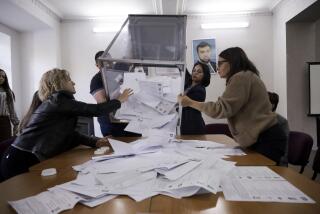High Turnout in Bosnia Seen as Suspicious
- Share via
SARAJEVO, Bosnia-Herzegovina — Two independent statistical analyses concluded Friday that the turnout in Bosnia’s elections appears to have been implausibly high, suggesting that victorious nationalist parties may have stuffed the ballot boxes.
The studies raise questions about the validity of the vote and pose a problem for the Clinton administration, which has invested U.S. prestige and troops in a Bosnian peace plan and is eager for the nationwide elections to be certified as reasonably democratic.
The International Crisis Group, an independent watchdog agency chaired by former U.S. Sen. George J. Mitchell (D-Maine), said it calculated the turnout in last Saturday’s presidential race, based on the estimated electorate and preliminary results, at 106.7%.
Citing the “mathematical impossibility” of such a vote, the agency demanded an investigation before results are certified.
“We think it smells,” said John Faucett, an official with the watchdog agency. “Something went wrong. . . . Either their [original] numbers were completely wrong or there were more votes than voters.”
Faucett stopped short of accusing parties of cheating.
The Organization for Security and Cooperation in Europe, which supervised the elections and is responsible for certifying its results, said it is looking into the allegations and “massaging numbers” to determine if anything is amiss.
*
Complicating the calculations is the fact that no one was absolutely sure of the size of Bosnia’s electorate going into the elections.
The OSCE used a U.N.-generated figure of 2.9 million eligible voters, based on the last complete census conducted in 1991 and adjusted for the approximately 250,000 people who were killed in Bosnia’s 43-month war. Also, more than half the electorate are refugees expelled from their homes during the war and either living abroad or displaced within Bosnia-Herzegovina.
If the fraud was as massive as some fear, the OSCE’s role in supervising the elections will come under more criticism than it already has.
Some have attacked the agency, which has spent $100 million to conduct the elections, for failing to crack down on campaign abuses and for insisting on going ahead with the vote even though “free and fair” conditions did not exist. The Dayton, Ohio, peace accord that stopped Bosnia’s war required such conditions before the elections could occur.
The International Crisis Group, which earlier advocated postponement of the elections, made its analysis public Friday.
Separately, another study by Western analysts--which has not been made public--calculated that the turnout of Muslim voters in the Muslim-Croat federation may have been as high as 115%, while the turnout for Serbs in their half of the country, the Republika Srpska, may have reached 100%.
This study showed that the greatest level of apparent abuse in the Muslim-Croat federation was in downtown Sarajevo, the capital, and in the northwestern city of Bihac, where the ruling Muslim party faced its greatest opposition.
A senior Western official involved in this analysis said he believes that the ruling nationalist parties--the Muslim-led Party of Democratic Action, or SDA, and the Serbian Democratic Party, or SDS--may have stuffed ballot boxes to ensure control of a joint legislature and two separate ones.
While such cheating would not have changed the results in the presidential contest--in which President Alija Izetbegovic of the SDA and the SDS’s Momcilo Krajisnik won places on a three-member presidency--it might have deprived Bosnia’s fledgling opposition parties of valuable seats in the government, the official said.
Because the OSCE could not supply an adequate number of supervisors and monitors, most polling stations went without any international observation for a substantial period of time.
In most internationally supervised elections, organizers rely on local political parties to provide monitors who keep watch on each other as much as on the ballots. But because so many regions of Bosnia now belong to one ethnic group with a dominant nationalist party, it was often impossible to find opposition politicians to serve in a monitoring role.
Faced with questions about OSCE numbers, an agency spokesman said late Friday that the electorate may have been closer to 3.2 million than the 2.9 million that had been used until now.
*
Also Friday, the SDS filed a complaint calling for the annulment of many absentee ballots cast in Republika Srpska that the party alleged were handled improperly, lacked proper documentation and may have been fraudulent. It was unclear how many ballots this involved.
But Bosnian Serb officials said most of those votes went to Krajisnik’s opponent, Mladen Ivanic, who made a surprisingly strong showing that probably kept Krajisnik from securing the chairmanship of the three-member presidency.
More to Read
Sign up for Essential California
The most important California stories and recommendations in your inbox every morning.
You may occasionally receive promotional content from the Los Angeles Times.














